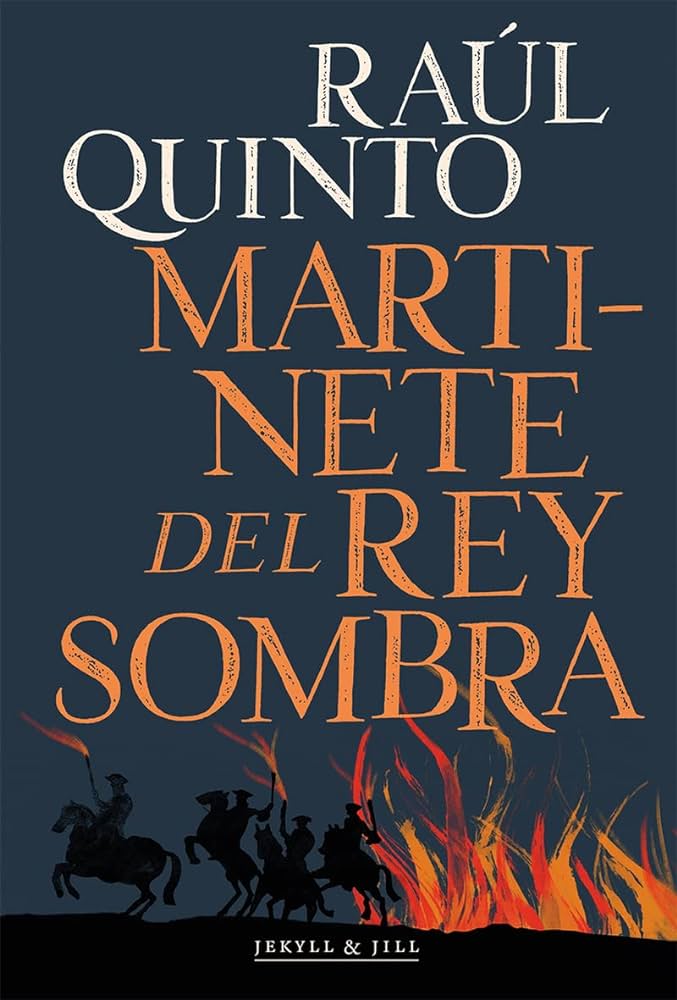“A brilliant proposal that, situated on the border between genres, creates an original fictional essay of historical interpretation” - Jury of the Spanish National Book Award
"He (Raúl Quinto) places himself between Marguerite Yourcenar and Éric Vuillard, and with this strategy he raises a novel that, despite its brevity, makes a tremendous noise when it falls on the table" - Álvaro Colomer, Cultura/s de La Vanguardia
"With the good taste for language and rhythm that characterises Raúl Quinto, this Martinete is one of the great novels of the season, which also puts its finger on one of the darkest and most savage episodes in Spanish history" - Revista Quimera
"Martinete del rey sombra should be studied in schools and high schools. It could be the class textbook to work on where the madness of intolerance can lead" - Eduardo Boix, Artes y Letras
Quinto belongs to "that constellation of authors born in the sixties and seventies who also conceive the novel as a formal and political laboratory. I am thinking of Marta Sanz, Isaac Rosa, Elvira Navarro and Gabriela Wiener. In their hybrid texts that speak, like Quinto's, about historical memory, social injustice or institutional violence" - Jorge Carrión
Winner of the 2024 Spanish National Book Award
Winner of the 2024 Critics Award
History and metaphor merge in Raúl Quinto’s work, like the best blend of Pierre Lemaitre and Éric Vuillard’s storytelling and Benjamin Labatut’s prose.
With his usual literary flair and knack for breaking genres, Raúl Quinto plunges us into the pitch-black night in which the shadow king launched a coordinated operation to exterminate the whole gypsy community across the Spanish kingdom. Though it might read as a cruel fable, The Hammer of the Shadow King is completely rooted in truth, which makes this novel a reflection of how collective memory is sometimes shaped by selective oblivion.
Quinto follows the hunt of the Gypsy community, from the night of their arrest on the 30 July 1749 to the amnesty granted eighteen years later, tracing their siege through makeshift prisons, grueling slave labor, and harsh living conditions. Their lives —marked by solation, torture, illness, and desperate escape attempts— coexist in stark contrast with the lavish world of the Court of the first Spanish Bourbons, basking in opulent excess. Visceral and poetic, Quinto threads together the voices of a community under siege with the decadence of Bourbon Spain.
A tour de force of literary excavation narrated with cinematic immediacy, where history is not merely revisited but reanimated.
At twelve o’clock at night Granada receives the assault of the hunters, under the command of Brigadier Manuel Morón there are four pickets and five dozen horses, which undertake their wolf-like work through houses, caves and customs. From the sky they can be seen, torch in hand, like a dance of nameless fireflies tracing a map of fire towards the apex of the darkness, saying who knows what in the language of the stars. Nobody has a face tonight, we said, not even Manuel Morón, who at this moment is barely a blurred shadow, an extension of lead and bone of the tricorn, with his mouth full of orders and his heart wrapped in fog. Nor can we see that of the Marquis de la Ensenada or that of Gaspar Vázquez Tablada, dissolved in the calligraphy of letters and the melancholy echo of palaces. Nor much less that of any of the one hundred and eighty bodies that parade, bound hand and foot, through the streets of the city in the early hours of the morning.
